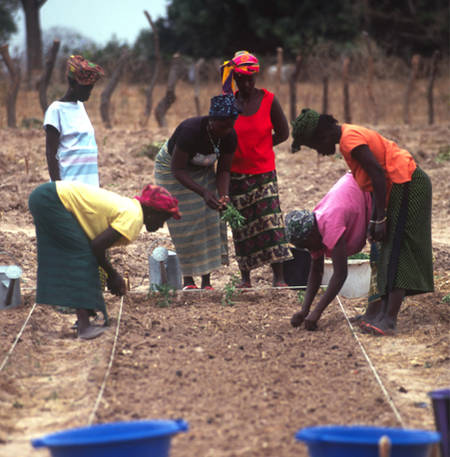In Action Against Malnutrition
The Gambia has high prevalence of stunting which have not changed over the years. The UNICEF nutrition causal framework clearly identifies three levels of causes of under-nutrition namely:
- immediate causes at the individual level (inadequate dietary intake and diseases);
- underlying causes (household food security, child and women care practices and health, environment and services) and
- basic causes (including income, economics, politics and governance).
Building on the three levels of causes of under-nutrition approach, the project aims to ensure positive nutrition outcomes targeting particularly vulnerable households where children are most at risk from malnutrition and proposes to work on two principal objectives:
Improving food security
Promoting employment in the agricultural sector through cash for work programmes, and increased food diversification through processing and fortification of locally available food crops.
Promotion of optimal nutrition and care practices
Promoting better nutrition and health outcomes among target groups, reduction of stunting through supporting household income, food diversification, treating acute malnutrition and promoting optimal care practices, particularly in areas worst affected.
These objectives address the immediate and underlying causes of malnutrition expressed in UNICEF’s Conceptual Framework for intervention.
Stakeholders
The main stakeholders of the proposed action are the three UN Agencies (FAO, WFP, and UNICEF), government institutions, civil society and communities with the financial support of the European Commission's Directorate-General for International Cooperation and Development (DG DEVCO) and the Delegation of the European Union to The Gambia.
Further, implementation partners include:
- The National Nutrition Agency (NaNA) and the Ministry of Health and Social Welfare will work closely with UNICEF and WFP on nutrition sensitive interventions.
- The Ministry of Agriculture will work closely with FAO in input distribution as well as farmer capacity building.
FAO will act as coordinating agency. This implementation entails responding to major post-crises scenarios promoting structural and resilient actions aiming at improving the capacity to prepare for, to withstand and to bounce back after shocks or stressors.
UNICEF will partner with The National Nutrition Agency (NaNA) and the Ministry of Health and Social Welfare to promote optimal maternal and child health and nutrition, as well as strengthening the access to improved water and sanitation services at the community and health facility level in all the targeted regions.
WFP will be responsible for nutrition specific and sensitive interventions focusing on food fortification and diversification and prevention and treatment of acute malnutrition.



